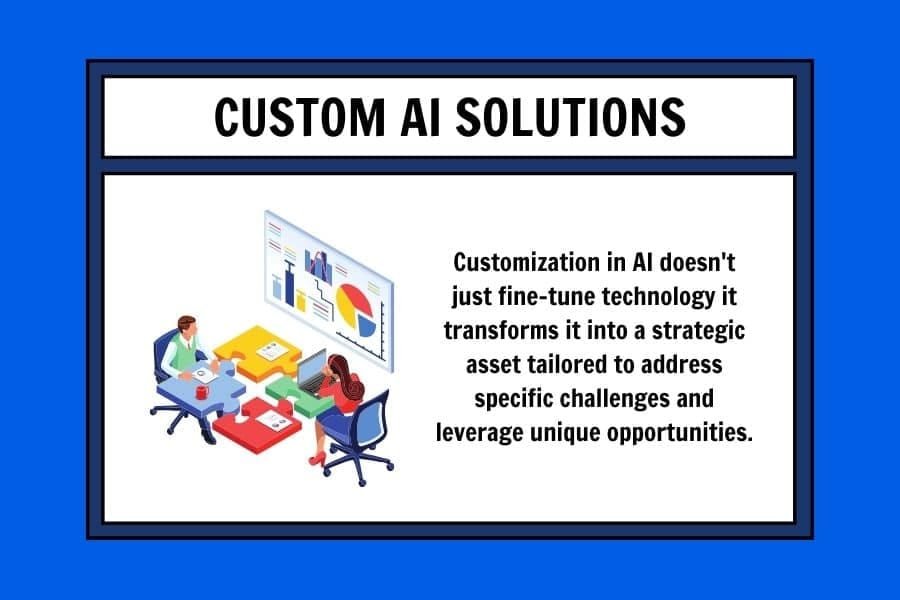Explore the world of custom AI solutions tailored to meet your unique business needs. Discover how personalized AI can enhance efficiency, accuracy, and scalability, driving transformative outcomes for businesses across industries. We’ll cover the essential components, development steps, and future trends in AI customization.
Introduction
In an era where technology constantly evolves, custom AI solutions have emerged as a game-changer for businesses striving to stay ahead. Tailoring artificial intelligence to specifically meet the unique challenges and objectives of your company isn’t just an advantage—it’s becoming a necessity.
Whether enhancing operational efficiency, boosting accuracy, or scaling new heights, customized AI is designed to fit your exact needs. In this post, we’ll explore how these bespoke AI systems are not just solutions but transformative tools that redefine the boundaries of what businesses can achieve. Unlock the power of AI in your business with Custom AI solutions.
Understanding AI: Basics and Beyond
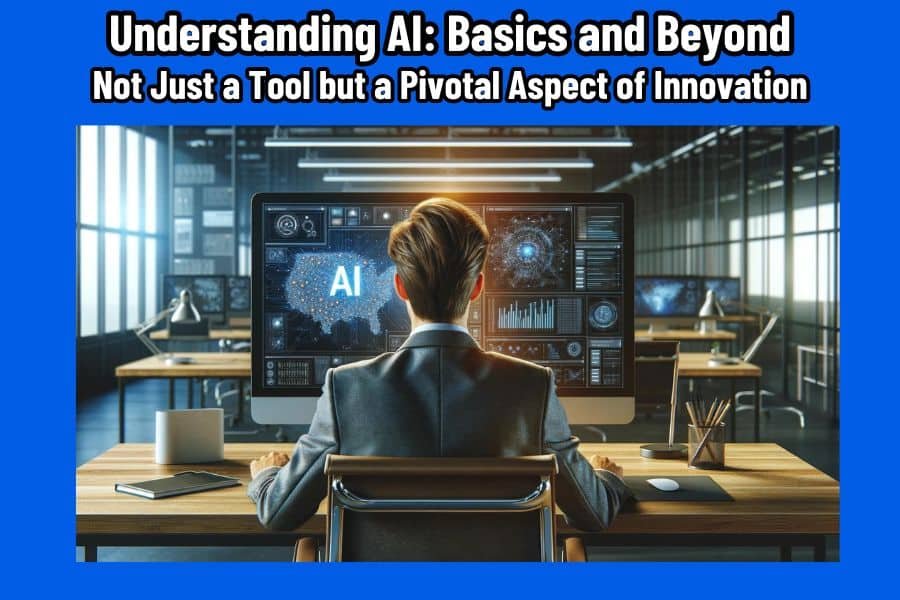
As we venture deeper into the realm of custom AI solutions, it’s essential to grasp the foundational elements of artificial intelligence. Understanding AI not only empowers us to appreciate its capabilities but also enables us to envision its customized applications in various industries.
Definition of AI
Artificial Intelligence, commonly known as AI, refers to the simulation of human intelligence in machines that are programmed to think and learn like humans. The core idea is to enable machines to perform tasks that typically require human intelligence, such as visual perception, speech recognition, decision-making, and language translation. At its heart, AI is about creating algorithms that allow computers to take on tasks that would otherwise rely on human cognition, often much faster and with fewer errors.
Types of AI
Key AI types are based on capabilities and functionalities:
- Narrow AI: Also known as Weak AI, this type of artificial intelligence is designed to perform a narrow task (e.g., facial recognition or internet searches) and is the most common form of AI in use today.
- General AI: An AI system with generalized human cognitive abilities. When presented with an unfamiliar task, a true AGI system can find a solution without human intervention.
- Superintelligent AI: A form of AI that surpasses human intelligence across all aspects, including creativity, general wisdom, and problem-solving skills.
From helping cars navigate the roads autonomously to predicting what you’ll buy next online, AI’s applications are vast and continuously expanding. Each AI type plays a pivotal role in shaping the tailored solutions that custom AI solutions aim to offer, making the technology not just a tool but a pivotal aspect of innovation.
Why Custom AI Solutions?
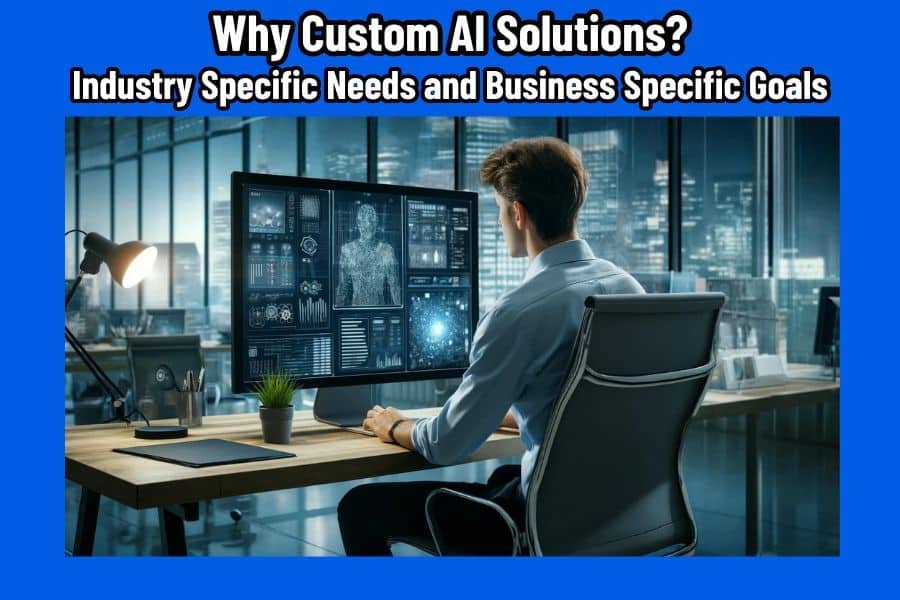
In today’s fast-paced digital world, the one-size-fits-all approach is often not enough. This is particularly true in the realm of AI, where the diversity of business environments and industry demands necessitates custom AI solutions. AI Customization doesn’t just fine-tune the technology—it transforms it into a strategic asset tailored to address specific challenges and leverage unique opportunities. Outsmart your competition with AI driven innovation.
Industry-Specific Needs
Every industry has its own set of challenges and requirements that standard AI applications may not fully address. For example, the healthcare sector benefits tremendously from AI systems designed to process and analyze large volumes of patient data quickly and with high precision, leading to faster and more accurate diagnoses.
On the other hand, the finance industry utilizes AI for risk assessment, fraud detection, and personalized customer service, each application requiring deep customization to align with regulatory standards and client expectations.
These examples highlight the critical need for AI systems to be engineered with the nuances of specific industries in mind, ensuring they deliver value that is both impactful and compliant.
Business-Specific Goals
Tailoring AI to meet business-specific goals is about aligning tech solutions with strategic objectives. For instance, a retail company might implement AI to enhance customer experience through personalized recommendations and optimized inventory management. Conversely, a manufacturing firm might leverage AI for predictive maintenance, thus reducing downtime and operational costs.
Each business has unique goals, such as increasing efficiency, reducing error rates, or scaling operations, and custom AI solutions are pivotal in helping turn these goals into reality. By integrating AI that resonates with the specific aspirations and operational frameworks of a business, companies can achieve a competitive edge that is finely tuned to their market and operational dynamics.
Key Benefits of Custom AI Solutions
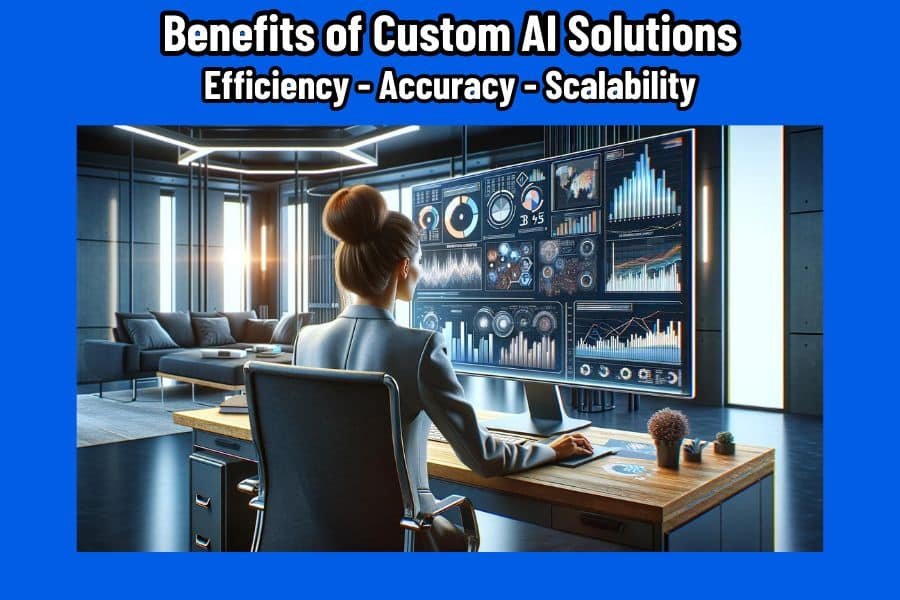
Investing in custom AI solutions offers a myriad of benefits that can revolutionize the way businesses operate, making them more agile, insightful, and efficient. The advantages extend beyond mere automation, providing significant enhancements in efficiency, accuracy, and scalability.
Enhanced Efficiency
Custom AI solutions are designed to optimize processes and reduce the workload on human employees, allowing them to focus on more strategic tasks. For example, AI can automate routine tasks such as data entry, scheduling, and customer queries, which not only speeds up these processes but also eliminates human error.
A notable instance is in the logistics sector, where AI-driven efficiency in route optimization has reduced delivery times by calculating the fastest and most fuel-efficient routes in real-time. This not only accelerates operations but also significantly cuts down costs and environmental impact.
Improved Accuracy
Accuracy in business operations is critical, especially in fields like finance and healthcare, where errors can have serious repercussions. Custom AI solutions excel in areas requiring high precision and meticulous attention to detail.
In healthcare, AI algorithms are used for diagnostic purposes, such as analyzing medical images with a level of accuracy that rivals, and sometimes surpasses, human experts. These AI systems are trained on vast datasets, allowing them to detect minute anomalies that might be overlooked by the human eye, leading to early and more accurate diagnoses.
Scalability
One of the standout features of custom AI solutions is their scalability. Businesses can start with AI applications at a smaller scale and expand as needed without significant additional costs. For instance, an e-commerce platform can implement AI to handle a few customer service queries and then scale up to manage thousands of interactions simultaneously as the business grows.
This scalability ensures that businesses can grow their AI capabilities in tandem with their expansion, providing continual support and enhancement without the need for constant redesign or significant new investments.
Key Components of a Custom AI Solution
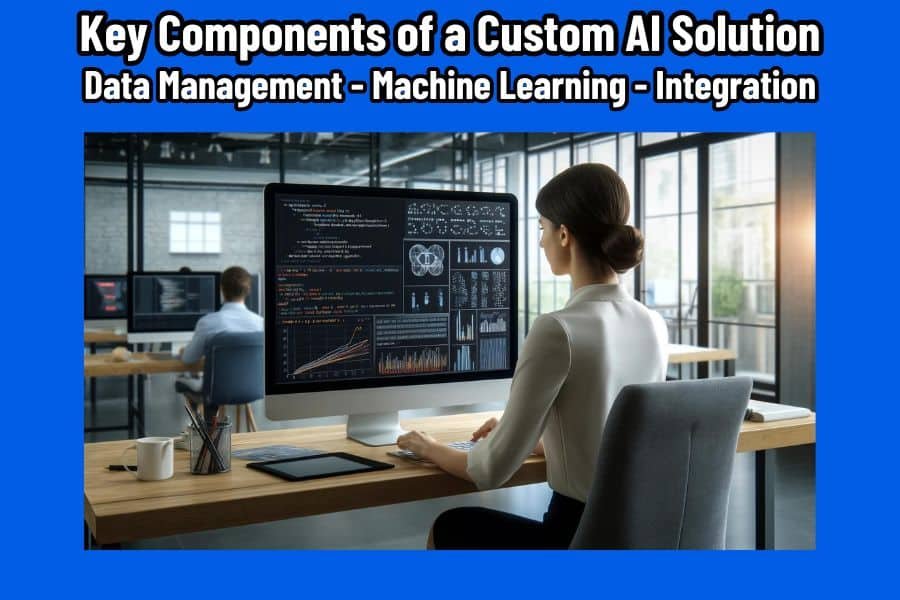
Creating effective custom AI solutions involves several critical components that work together to harness the full potential of AI technology tailored to specific business needs. Understanding these components is key to developing solutions that not only perform well but also integrate seamlessly with existing business processes.
Data Management
At the core of any AI system is data. Effective data management is crucial for the success of custom AI solutions. This involves the collection, storage, and processing of data in a way that is secure, efficient, and scalable.
For instance, in the retail industry, AI systems analyze customer data to predict purchasing behaviors and preferences, which requires a robust data management system to handle and analyze massive volumes of data in real-time.
Additionally, proper data management ensures that the data used is of high quality and relevance, which directly impacts the accuracy of the AI outputs.
Machine Learning Models
Machine learning models are the brain behind AI, enabling systems to learn from data, make decisions, and improve over time without being explicitly programmed. In custom AI solutions, these models are tailored to specific business tasks such as predicting market trends, detecting fraudulent activities, or automating customer support.
For example, financial institutions use machine learning models to assess the risk of loans based on a complex array of factors that traditional banking algorithms might not effectively consider. These models are continuously refined and adjusted to improve their accuracy and effectiveness.
Integration with Existing Systems
For AI to deliver its full value, it must be seamlessly integrated with a business’s existing systems — whether that be CRM software, ERP systems, or customer databases. This integration ensures that AI processes are embedded in the workflow without disrupting existing operations.
Successful AI integration also allows AI to leverage existing data and systems to enhance functionalities, such as improving customer relationship management or streamlining supply chain logistics. This component is often one of the most challenging yet crucial for the success of custom AI solutions, requiring meticulous planning and expert technical execution.
Key Steps in Developing Custom AI Solutions
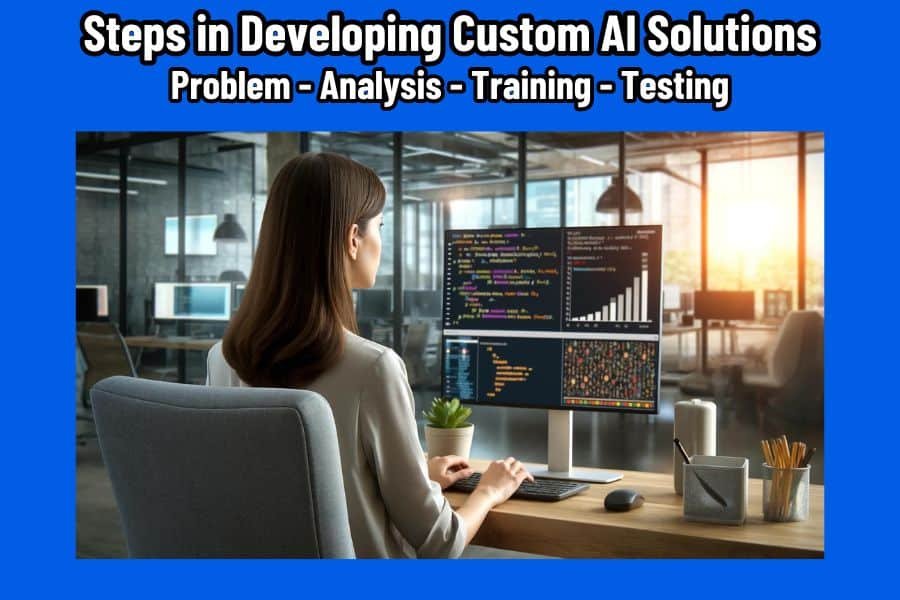
The development of custom AI solutions is a painstaking process that involves several critical steps. Each stage is vital to ensuring that the AI system not only meets the specific needs of the business but also integrates smoothly into existing workflows to provide maximum benefit.
Identifying the Problem
The first step in crafting any custom AI solution is to clearly define the problem it is meant to solve. This involves understanding the nuances of the issue, the impact on the business, and the desired outcome.
For instance, a company may identify excessive operational costs due to inefficiencies as a problem. By pinpointing the exact nature of the inefficiencies, AI developers can tailor a solution specifically designed to address those issues, ensuring the AI system has a clear focus and purpose from the outset.
Data Collection and Analysis
Once the problem is defined, the next step involves gathering and analyzing relevant data, which will feed into the AI models. This stage is crucial because the quality and quantity of data collected directly affect the performance of the AI solution.
For example, if the problem involves predicting customer churn, data on customer interactions, purchase history, and feedback would be collected. This data is then meticulously analyzed to identify patterns and trends that can inform the development of the AI model.
Building and Training AI Models
With the problem defined and data analyzed, the next step is to build and train the AI models. This involves selecting appropriate algorithms and techniques to develop a model that can accurately predict outcomes or automate tasks.
In our customer churn example, machine learning techniques would be used to train a model on historical data to predict future churn. The training process is iterative, with the model being continually refined as it learns from the data until it achieves the desired level of accuracy.
Implementation and Testing
The final step in the AI development process is implementing and testing the AI system within the business environment. This involves integrating the AI model with existing systems and then rigorously testing it to ensure it functions as expected.
During this phase, issues such as compatibility with current systems, scalability, and performance under different conditions are addressed. It is also the stage where final tweaks are made to ensure that the AI solution is fully optimized to meet the specific needs of the business.
Key Challenges in Custom AI Development
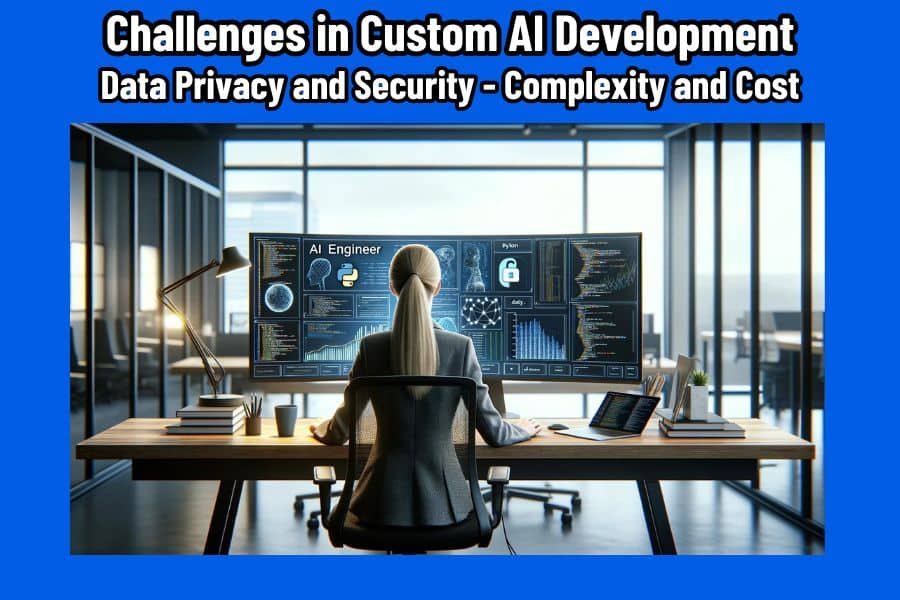
While the benefits of custom AI solutions are substantial, the path to creating and implementing these technologies is not without its hurdles. Understanding these challenges is crucial for businesses to prepare adequately and ensure the successful deployment of AI technologies.
Data Privacy and Security
AI security challenges and the privacy of data are the most significant concerns when implementing AI. As AI systems require vast amounts of data to function optimally, they become prime targets for cyber threats. For example, a breach in a healthcare AI system could expose sensitive patient information, leading to severe privacy violations and legal consequences.
To mitigate these risks, businesses must invest in robust security measures, such as encryption and secure data storage solutions, and comply with data protection regulations to safeguard user data.
Complexity and Cost
Developing custom AI solutions is inherently complex and can be costly. The intricacy of designing AI systems that cater specifically to the nuances of a particular business model adds layers of complexity not found in off-the-shelf solutions. Moreover, the costs associated with developing these bespoke systems can be prohibitive for small to medium enterprises.
The expenses are not only tied to the initial development but also to ongoing maintenance and updates necessary to keep the AI system effective and secure. Despite these costs, the long-term benefits, such as increased efficiency and competitive advantage, often justify the investment.
Understanding these challenges is essential for any business considering the integration of AI into their operations. By acknowledging and addressing these hurdles, companies can better position themselves to leverage the transformative power of custom AI solutions effectively.
The Future of Custom AI Solutions
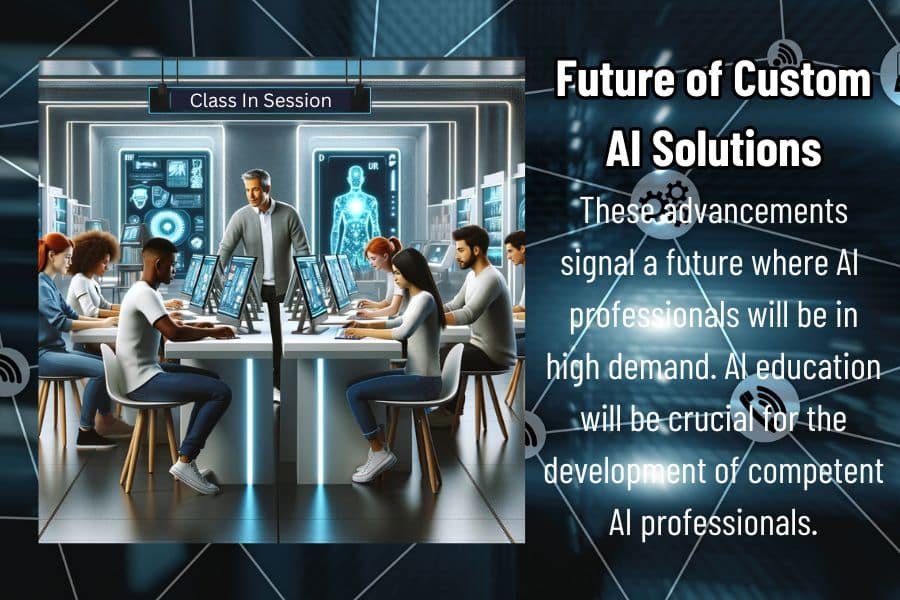
The landscape of custom AI solutions is continually evolving, driven by rapid technological advances and changing business needs. Looking ahead, the future of AI in business promises even more personalized, efficient, and groundbreaking solutions.
Trends and Predictions
As businesses increasingly rely on AI, several key trends are shaping the future of custom AI solutions. Firstly, the integration of AI with IoT (Internet of Things) is gaining traction, providing businesses with unprecedented levels of data and insights into customer behaviors and operational efficiency.
Another significant trend is the use of AI for sustainable practices, helping companies reduce their carbon footprint and optimize resource use through smarter decision-making. AI-driven automation in workplaces is expected to enhance productivity and create new roles focused on managing AI systems rather than performing routine tasks.
Evolving Technologies
The technological foundation of AI is also advancing rapidly. Quantum computing, for example, is set to revolutionize AI’s capability by significantly speeding up the processing of massive datasets, enabling more complex and precise AI models.
Similarly, advancements in neural networks are making AI more adaptable and capable of learning with less human intervention. These evolving technologies not only enhance the performance of custom AI solutions but also expand their potential applications, making AI a central element in future business strategies.
AI Education
AI education is crucial for the development of competent AI professionals capable of crafting superior custom AI solutions, primarily because the field of artificial intelligence is complex and rapidly evolving. A solid educational foundation in AI equips professionals with a deep understanding of both theoretical concepts and practical applications, enabling them to navigate and innovate within this dynamic landscape.
As AI technologies become increasingly integral across various sectors, the demand for skilled professionals who can tailor AI solutions to specific business needs and challenges also grows. Therefore, comprehensive AI education not only fosters a skilled workforce but also drives the advancement of more effective and innovative AI solutions, ensuring that the technology continues to evolve in ways that are ethical, sustainable, and beneficial across industries.
Conclusion: The Impact of Custom AI Solutions
The journey through custom AI solutions reveals a transformative landscape where technology meets tailored needs. From enhancing efficiency and accuracy to ensuring scalability, these solutions can redefine business operations. With the integration of advanced data management, specialized machine learning models, and all-in-one marketing platforms with seamless system integrations, businesses must adapt in order to thrive.
These advancements signal a future where AI is not just a tool for business enhancement but a fundamental aspect of how businesses operate and innovate. As technology continues to evolve, so too will the possibilities for customized AI solutions, fundamentally altering the competitive landscape and offering exciting opportunities for businesses that adapt effectively.
FAQs: Custom AI Solutions
Exploring the realm of custom AI solutions raises several common questions. Here, we address some of the most frequently asked queries to demystify the process and application of AI in business contexts.
What are the main types of AI?
AI can generally be categorized into three main types:
- Narrow AI: This is the most commonly implemented form of AI, designed to perform a specific task, such as voice recognition or internet searches.
- General AI: This type of AI possesses the ability to understand and learn any intellectual task that a human being can. It’s a flexible form of intelligence not yet fully realized in technology.
- Superintelligent AI: This theoretical form of AI surpasses human intelligence across all aspects, including creativity, emotion, and social skills.
What are custom AI solutions?
Custom AI solutions refer to AI systems that are tailored to meet the specific needs of a business or industry. Unlike off-the-shelf AI products, these solutions are designed from the ground up to address particular challenges, integrate seamlessly with existing business processes, and enhance operational efficiency and decision-making based on unique business data and goals.
How do you create an AI solution?
Creating an AI solution involves several key steps:
- Identify the Problem: Clearly define what you need the AI to solve.
- Gather and Analyze Data: Collect the data that will feed into the AI model.
- Develop the AI Model: Choose the appropriate algorithms and techniques, and train the model to meet your needs.
- Integration and Testing: Integrate the AI with existing systems and rigorously test it for performance and accuracy.
How much do custom AI solutions cost?
The cost of custom AI solutions can vary widely depending on the complexity of the project, the data requirements, and the specific goals of the business. Prices can range from thousands to millions of dollars. Smaller projects might only need modest investments, while larger, more complex systems could require significant resources, including a team of AI specialists.
Can I create my own AI software without writing code?
Yes, there are platforms available that allow individuals to create AI models without traditional coding through what’s known as no-code AI platforms. These tools provide a user-friendly interface where you can train models using visual data and pre-built algorithms. However, for more customized or complex solutions, some coding knowledge might still be required.
What is the difference between AI and a Chatbot?
A chatbot is a specific application of AI designed to simulate conversational interactions with users. While all chatbots utilize some form of AI, not all AI systems are chatbots. AI encompasses a broader range of technologies and applications, from machine learning models predicting stock market trends to autonomous vehicles navigating traffic. Chatbots are primarily focused on enhancing customer service and engagement through conversation.
Resources: Custom AI Solutions
To further your understanding and exploration of custom AI solutions, here are carefully selected online resources and books that offer deep insights and practical guidance.
SPECIAL NOTE: “The information provided in this post is based on research using the Resources listed below along with other similar sources. While we try to keep the information for this post current, there are no representations expressed or implied, about the completeness, or accuracy of the information provided. If you choose to apply ideas or information contained in this post, you are responsible for your actions”.
Online Resources
- Towards AI – This platform offers a wealth of articles, research papers, and case studies on various aspects of artificial intelligence, including custom solutions. It’s a great resource for staying updated with the latest trends and innovations in AI. Towards AI
- Google AI Blog – Here, Google shares insights into their cutting-edge AI developments. It’s an excellent resource for understanding how major tech companies approach the creation and implementation of custom AI solutions. Google AI Blog
Books
- “Artificial Intelligence: A Guide for Thinking Humans” by Melanie Mitchell – This book provides a clear overview of AI, its capabilities, limitations, and the future of custom AI solutions, making complex concepts accessible to non-experts.
- “Architects of Intelligence” by Martin Ford – Ford interviews top AI minds to explore the future of artificial intelligence and its impact on society, including discussions on custom AI developments.
- “Superintelligence: Paths, Dangers, Strategies” by Nick Bostrom – Bostrom’s work delves deep into the implications of advanced AI systems, which is crucial for understanding the broader impacts of custom AI solutions.
- “Machine Learning Yearning” by Andrew Ng – While focused on machine learning, this book is invaluable for anyone looking to understand how to strategically think about developing AI solutions that are custom-fitted to specific business problems.
These resources provide a robust foundation for anyone interested in understanding and utilizing custom AI solutions within their business or field.
Custom AI Solutions: All-In-One Digital Marketing Platform: [JOIN HERE FOR FREE]

